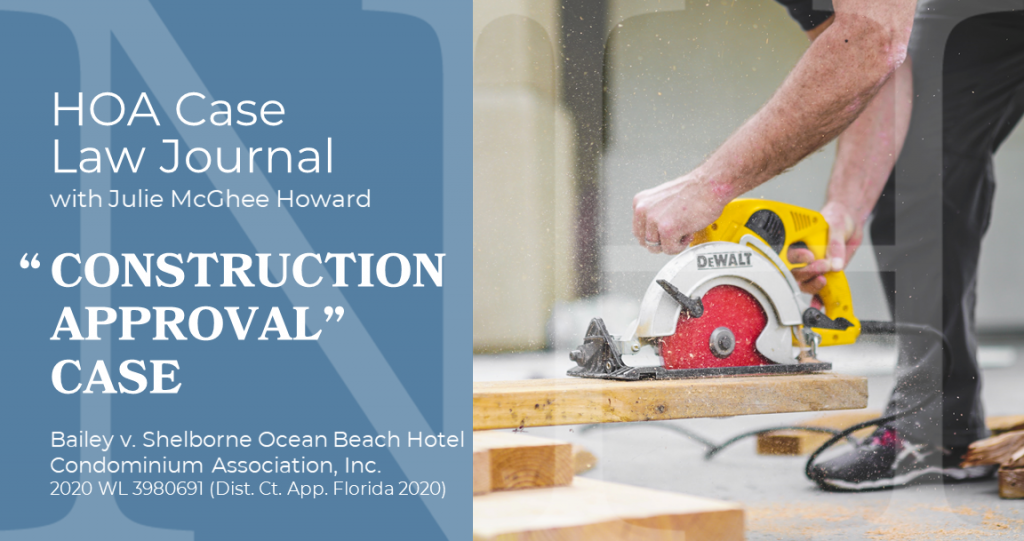Bailey v. Shelborne Ocean Beach Hotel Condominium Association, Inc.
2020 WL 3980691 (Dist. Ct. App. Florida 2020)
When a Condominium Association Seeks Owner Approval, After-The-Fact: A Florida Appellate Court Case
Construction projects are often a part of a condominium association board’s most impactful business and can define the year, or several years, as these projects can be large and far-reaching, changing the nature of a community. In Florida, an appellate case highlighted the need for strict compliance by the condominium board of directors to their governing documents and clear understanding of the statutory process.
The Facts:
The Shelbourne condominium board of directors authorized two major construction projects between the years 2010 and 2014. These projects were to be funded with $30 million spread out in seven special assessments, paid for by the unit owners.
The condominium board acted on its own to approve both the construction and the special assessments without previous approval by the unit owners through a vote.
After construction was completed, in May 2014 and February 2016, the condominium board called for a unit owner vote to approve the two construction projects, which was approved by the required 75% vote.
40-unit owners, however, filed suit against the condominium board, alleging, among other things, breach of fiduciary duty and violations of the Florida Condominium Act which prohibits any material alteration or substantial additions to association property except as allowed by the declaration, otherwise the Act states,“75 percent of the voting interests of the association must approve the alterations or additions.”
The Issue of the Suit:
The unit owners’ lawsuit argued that, according to the governing statute, approval for any construction project must be approved by 75% of the unit owners before any construction could begin and that in moving forward with construction without owner approval, the condominium board violated the statute. It should be noted that this statute is narrow and would not have applied to routine maintenance or other expenses but is expressly specific to material or substantial construction altering or adding to the association property.
The condominium board and their attorneys argued that because the statute did not specify timing of the 75% approval by the owners, they were still within their rights and responsibilities to seek owner approval after construction was completed and that they had acted in good faith. The condominium board argued that, based on the language of the statute, owner approval for the construction could be sought and given at any time.
Court Decision
The Appellate Court disagreed with the condominium board and their attorneys, siding with the unit owners. In the written opinion, the court described the Board’s position as “absurd” and that, based upon the board’s argument, there could never be a violation of this statute as approval would always be “pending.” The Florida Court of Appeal held that owner approval must be given before construction begins based on the “structure and logical relation of [the statute’s] parts.”
The Cautionary Tale
In moving forward with the construction project with an untested perspective of the statute, the condominium board created havoc in the community and an existential crisis that could easily have been avoided. While it is unclear whether they would have gained 75% owner approval prior to the construction, it is very clear that they could have avoided a dramatic and disappointing failure had they sought a better understanding of the law. The lesson learned from this case is that HOA and condominium association boards of directors must be extraordinarily careful when taking advantage of what appears to be a loophole in the law. When in doubt, consult with your community association attorney.
Contact NowackHoward for HOA Law Advice to Help Guide Your Board of Directors
At NowackHoward, we focus on condominium association and HOA law throughout Georgia. To learn more about our community association practice and how we can help guide your community, contact one of our attorneys today at (770) 863-8900 or by email at info@nowackhoward.com.


